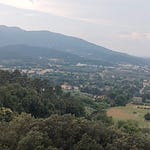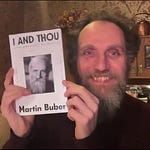I think there’s hunger for more than just food in our communities. There’s hunger for connection and a sense of belonging. There’s a hunger to feel grounded.
We all felt it, but
was the one to name it, as we came to the Q&A at the end of this second Sunday Session: “Michael,” she said, “you have one of the calmest energies I’ve ever witnessed.”This was the atmosphere in which Michael led us into the story of an urban food project which began with him walking the broken streets of Ōtautahi/Christchurch in the aftermath of the 2011 earthquake. He’d lost his job and had a ten-month-old baby, and it was in these circumstances that his life took the turning that led to what became Roimata Food Commons.
Following the thread of this work, our conversation wove together Michael’s story with other examples of projects rethinking how we feed ourselves and our communities in ways that aren’t held hostage by the market – or the logic of the state, in its inhuman and bureaucratic forms. All of this is guided by a double recognition that these approaches to food-growing are not rational or even viable within the logic around which our societies are currently structured, but that they carry a lot of the knowledge, skills and practices that will be all we have to fall back on when this logic fails us.
So follow along as we trace what Michael calls “the journey that isn’t measured in miles, it’s measured in wholeness” – and hear how he and his friends are “rewilding local government” by infecting the culture of the city council with their commoning practices.
As always, the first forty minutes of our conversation are available to everyone, along with the links to projects we talked about and further reading in the Shownotes. To watch the Q&A that follows, you’ll need a paid subscription to Writing Home – which is also your ticket to join us live for the third in this season of “overheard conversations” when I’ll be talking to
of . That session will take place at 8pm CEST on Sunday 7 April, 2024.Shownotes
Follow the work of the Roimata Food Commons at their website – or get in touch with Michael at foodsystemchangecatalyst at gmail.com. Watch the twelve-minute documentary by Happen Films to get a picture of the project.
Bentley Urban Farm is an “upcycled market garden” in a former mining community on the edge of Doncaster, South Yorkshire. Read more about their story here.
shares what he is learning about growing and distributing food outside of the market economy through .Pam Warhurst is the founder of Incredible Edible. Here are some clips from the event where I first heard her speak in 2011.
Silence is a Commons is the short text in which Ivan Illich offered a powerful definition of “the commons”, not as a way of managing resources, but as an alternative to seeing the world as made of “resources”:
People called commons that part of the environment which lay beyond their own thresholds and outside of their own possessions, to which, however, they had recognized claims of usage, not to produce commodities but to provide for the subsistence of their households. The customary law which humanized the environment by establishing the commons was usually unwritten. It was unwritten law not only because people did not care to write it down, but because what it protected was a reality much too complex to fit into paragraphs.
Anthony McCann’s article Enclosure Within and Without the ‘Information Commons’ also helps to distinguish between these contrasting ways of using the language of commons.
I sketched out my own thoughts on the commons in The Friendly Society: On Cooperation, Utopia, Friendship & the Commons.
The West Norwood Feast is the community-owned and -run street market that I helped to start when I was running Spacemakers.
The Art of Invitation is a phrase from the work of the Encounters collective (Lucy Neal, Anne-Marie Culhane and Ruth Ben Tovim). Read more in this post from Rob Hopkins.









